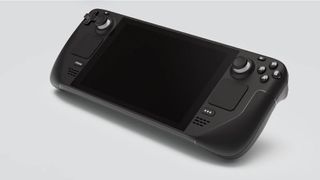Steam Deck is real – portable PC to rival Nintendo Switch from Valve is on the way
But will it just be Steam Machines all over again?

A store listing for the Steam Deck has appeared, and it looks like Valve is getting in on the action of creating handheld gaming PCs, but this time with the power to actually play your games.
The Steam Deck will be powered by a custom APU using AMD Zen 2 and RDNA 2 architectures, which is roughly equivalent to an AMD Radeon RX 6000 series graphics card and a Ryzen 3000 processor. Valve claims that this hardware will be more than enough to play all the AAA games in your Steam library, something that current handheld gaming PCs simply can't handle.
- Here are the best gaming PCs
- Check out the best graphics cards
- Here are the best PC games
The APU will feature a 4-core/8-thread processor and a GPU with 8 RDNA 2 CUs. To put that in perspective, the weakest AMD RDNA 2 GPU right now is the Radeon RX 6700 XT, which has 40 compute units. That means that while this handheld PC should be able to play most games, it's probably going to be limited to medium settings at its native resolution of 1,280 x 800 in the most demanding PC games.
It will also feature 16GB of RAM and will start with just 64GB of eMMC storage, with more premium models including more capacious (and faster) NVMe SSDs. If you run out of storage, you can also use a MicroSD card and run PC games right off of that.
And, just like the ill-fated Steam Machines, this will also be running on SteamOS, which means that you won't be able to play your whole gaming library natively, unless you can load Windows 10 or Windows 11 alongside the Linux-based native OS.
If you want to get your hands on the Steam Deck, it will ship in December 2021, but you can reserve one of your own here on July 16 at 10am PDT (1pm EST, 6pm GMT). The Steam Deck will start at $399 for the 64GB model, and will go up to $649 for a model with a 512GB NVMe SSD.
A less portable Switch?
While the Steam Deck looks a lot like the Nintendo Switch, it's significantly more powerful, which means it's a bit bigger. It's about 298mm (11in) long, and 49mm (1.9in) thick. For comparison's sake the Switch is 9.4 inches long and 0.55 inches thick.
Get daily insight, inspiration and deals in your inbox
Get the hottest deals available in your inbox plus news, reviews, opinion, analysis and more from the TechRadar team.
The comparisons don't end there. Valve will also be working on its own dock for the Stream Deck, though it will be sold separately. But while the Nintendo Switch is still basically just a Nintendo Switch when you have it on your TV, the big selling point for the Steam Deck is that you can connect it to a dock – whether it's Valves or another USB-C dock, third party docks will work just fine. When it's connected to a dock it'll act just like any desktop PC.
During IGN's hands-on with the Steam Deck, Valve even clarified that it's not going to restrict what kinds of software people can run on the device. You can install whatever programs you want to, use whatever peripherals you want, and you can even totally replace SteamOS 3.0 with Windows 10 if you so choose.
The Steam Deck also has a much more diverse set of controls. Below each of the thumbsticks is a trackpad – just like the Steam Controller – but it's apparently a much newer iteration of the technology that combines with a gyroscope to boost accuracy. There's also some extra buttons on the back of the device.
We're still not sold on using a controller like this to play PC games that are best played with mouse and keyboard, but it's an intriguing solution.
We've been here before
This isn't the first time that Valve has dipped its toes in the PC hardware world. Back in 2014, Valve unveiled the Steam Machine. This was basically a Steam-branded line of gaming PCs that ran on SteamOS and had a more console-like UI. '
Valve even created a very, uh, unique controller for its Steam Machines. The Steam Controller stood out because rather than having analog sticks like any other controller, it had touchpads with haptic feedback, which let gamers play games designed for mouse input like Civilization V.
However, just a few years later, Valve shuttered the storefront for Steam Machines, as they were expensive and the Linux-based OS couldn't run many of the most popular PC games without also installing Windows. This was probably because rather than making the hardware itself, Valve licensed out the Steam Machine brand to gaming PC manufacturers like Alienware to make glorified gaming PCs.
However, while the Steam Machine was a flop, the Valve Index hasn't been. While it hasn't been the VR revolution that Valve may have been hoping for – even after Half-Life: Alyx, it has been a success within the VR gaming community.
And while we wait for handheld gaming PCs like the Alienware Concept UFO, it's exciting to see this concept executed by a company with Valve's weight. It's going to be interesting to see just how well this thing handles the best PC games when it launches in December.
Bill Thomas (Twitter) is TechRadar's computing editor. They are fat, queer and extremely online. Computers are the devil, but they just happen to be a satanist. If you need to know anything about computing components, PC gaming or the best laptop on the market, don't be afraid to drop them a line on Twitter or through email.

